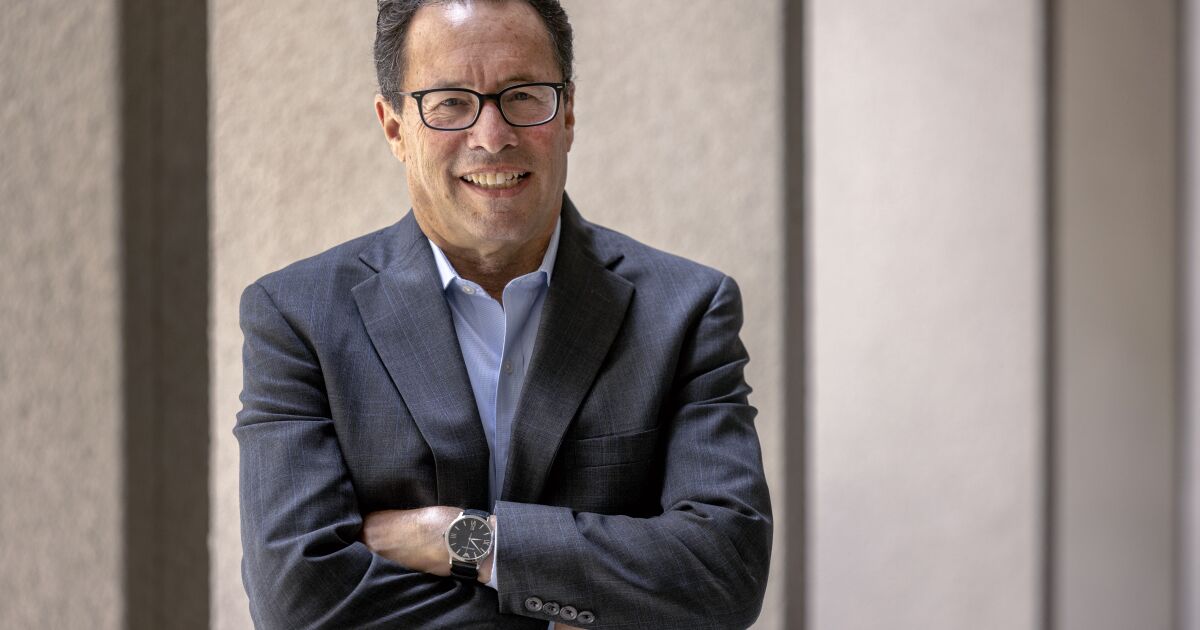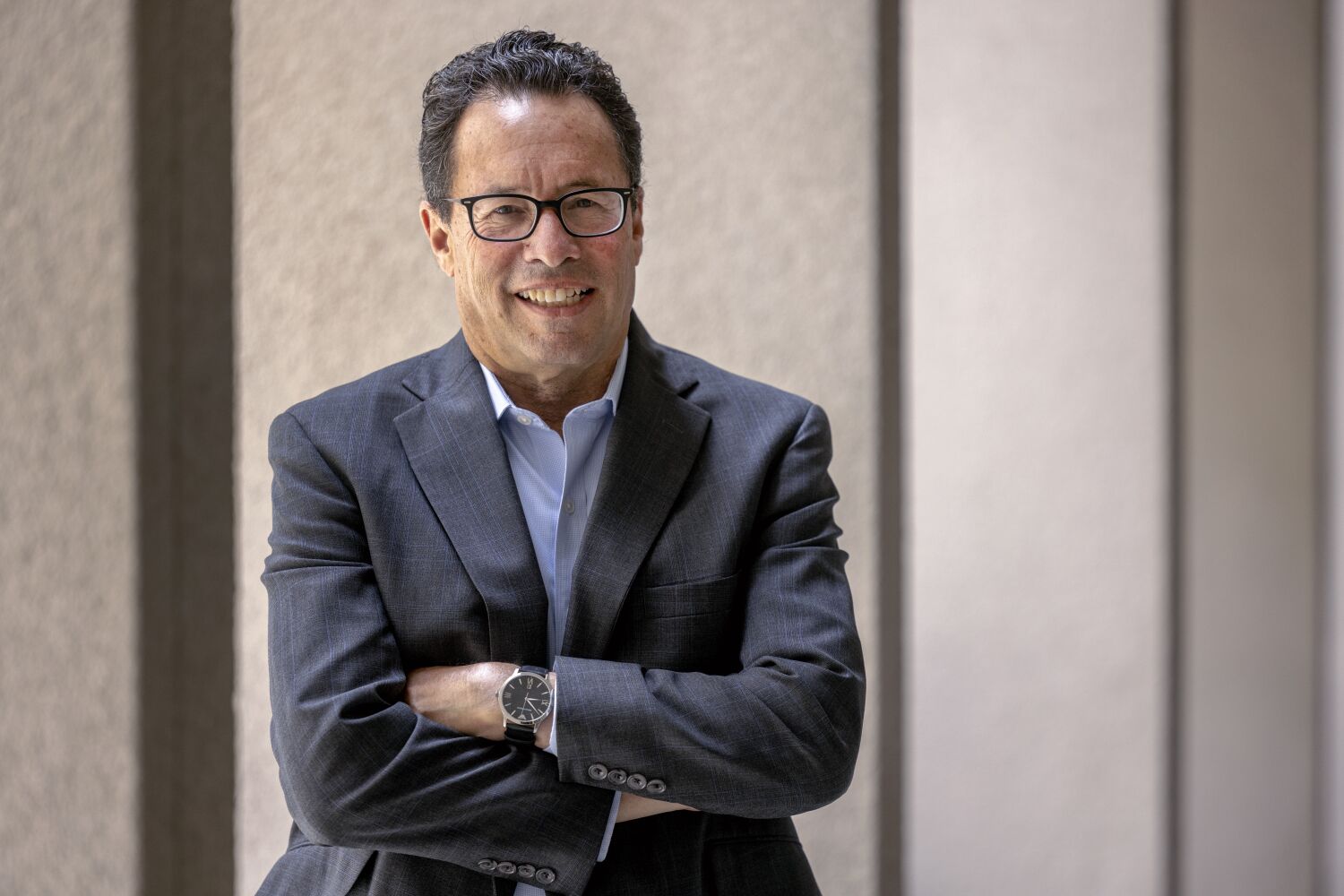He bombed the SAT but now heads the UC Board of Regents. A top priority: widening access


Rich Leib heads the University of California’s powerful Board of Regents. He has started companies, worked for leading state politicians and now runs a business consultancy.
But when he talks about his UC board priorities, he begins with a confession: As a Hamilton High School student in 1974, he bombed the SAT achievement tests, scoring in the bottom 2% for both math and English. He scored in the bottom 50% for the general SAT exam. With his 3.4 high-school GPA, UC Berkeley rejected his application.
He managed to get into UC Santa Barbara and went on to earn a master’s degree in public policy analysis from Claremont Graduate University and a law degree from Loyola Law School.
All of which leads to his message for students today: Don’t give up plans for college because you think others are smarter than you. Persevere.
“I feel like so many people get psyched out. They don’t even apply to a university, because the whole self-confidence thing is really difficult,” he said during a recent interview about his priorities. “But I went anyway to college. There were a lot of people that were super smart. I didn’t do great, but I did fine.”
Leib, 66, has been a cheerleader for public education for more than two decades, serving as a governing board member for the California Community Colleges and Solana Beach School District before joining the UC regents in 2018 as an appointee of then-Gov. Jerry Brown.
Now, as UC board chair, his top priority is to open the doors of higher education to more students of varied backgrounds to reflect California’s vast racial, ethnic, economic and geographical diversity.
Widen access
When UC Santa Barbara Chancellor Henry Yang presented a report about his campus at last month’s regents meeting, Leib was struck by some statistics. UC Santa Barbara’s admission rate dropped to 27% last year from 83% in 1993 and the average high school GPA soared to 4.28 from 3.48 during that same period.
“That was not a positive … that’s a negative,” Leib said. “Our goal is not to be exclusive; it’s to be inclusive.”
UC was flooded with a record number of applications last year, drawing nearly 132,000 from California residents for first-year seats. About 85,000 state residents were admitted. But Leib says that’s too few and admission rates are too low — particularly at the system’s most selective campuses.
To make room for more students, Leib said, UC should explore creating a new campus — possibly in the Bakersfield or San Bernardino area. He supports the ongoing expansion of satellite campuses — as UCLA is doing with its recent acquisition of Marymount California University. UC Davis is developing a downtown center, and UC Merced and UC San Diego have opened ones. UC Berkeley is considering a satellite program at Moffett Field, owned by NASA, that would focus on aerospace science and engineering and also has land in Richmond for potential expansion.
Leib said Chula Vista city officials are eager for a UC San Diego satellite campus and have discussed providing land for it. He doesn’t think more online classes are the full answer; research shows many students do better with on-campus experiences.
Leib said parents in his San Diego area have come to him nearly in tears about their children who worked hard to achieve stellar academic records yet still got shut out of every UC campus to which they applied.
“There’s something wrong there,” Leib said. “They feel very disenfranchised. We need to do better.”
Expand diversity
Leib said UC needs to redouble efforts to attract more Black, Latino, rural and other underrepresented students. In the last decade, the 10-campus system has slipped in enrolling disadvantaged undergraduates, with the proportion of federal Pell Grant recipients declining to 33% last year from 42% in 2012 and first-generation students dropping to 37% from 41% during that same period.
UC also needs to make campuses more welcoming for all, he added. More Black student resource centers are needed for a group that makes up just 4.4% of undergraduates systemwide. Leib would like to see more support for Jewish students against rising antisemitism — adding that the decision last year by some UC Berkeley law students to adopt bylaws banning Zionist speakers from meetings have exacerbated their feelings of discomfort.
In addition, Leib said, more funding for the university system’s portfolio of 13 programs to enhance college preparation, raise academic performance and close achievement gaps for underserved students in high school and college could help more of them get admitted to UC and graduate.
Leib himself is trying to create a more welcoming climate on the Board of Regents, which he said has long been “very stuffy and formal.”
Promote UC research prowess
UC Berkeley’s Jennifer Doudna won a Nobel Prize for co-pioneering a gene editing method that was used to help fight the COVID-19 virus. UC San Diego’s Neal Driscoll helped develop and deploy infrared cameras that enabled firefighters to respond to the first signs of smoke across the state to control wildfires. UC Davis structural engineer Michele Barbato is developing new ways of building homes — with an engineered form of mud — that can withstand powerful earthquakes, hurricanes and fire.
And in a potentially world-changing feat, scientists with the Lawrence Livermore National Laboratory in December achieved the elusive goal of producing more energy from a fusion reaction than they put into it — an accomplishment hailed as progress toward a clean-energy future. The federal research facility was first established by UC, which continues to help manage it.
“It’s all happening at the UC,” Leib said. “We have an opportunity … to help solve some of California’s biggest problems.”
UC’s new Sacramento center — a public-policy teaching and research facility — can help promote the system’s research to legislators and appeal for financial support, Leib said. He is advocating for state funding to provide small grants to researchers to test out early ideas that can, if promising, lead to bigger federal grants.
Leib, along with Regent Lark Park, have also led regents to dive into ways to cut through bureaucracy so researchers can more quickly file for patents and licensing agreements involving their innovations. Doing so will help kick-start more new companies rooted in UC research and bring in new sources of funding to the system — another priority for Leib. He has asked Regent Ana Matosantos, a top fiscal expert in the last three gubernatorial administrations, to lead those efforts.
Leib, raised in West Los Angeles by a single mother who taught at Venice High School, retains a business consultancy after co-founding firms that developed cameras at intersections and recycle grease and food waste. His real job — unpaid except for a UC parking permit — is his full-time work as board chair. He sees his service in part as an act of gratitude for the UC education he received.
“I’ve always loved the university for what it does,” Leib said. “It can really help people from all backgrounds in terms of building our future. It’s the great equalizer.”
Share this news on your Fb,Twitter and Whatsapp
Times News Network:Latest News Headlines
Times News Network||Health||New York||USA News||Technology||World News